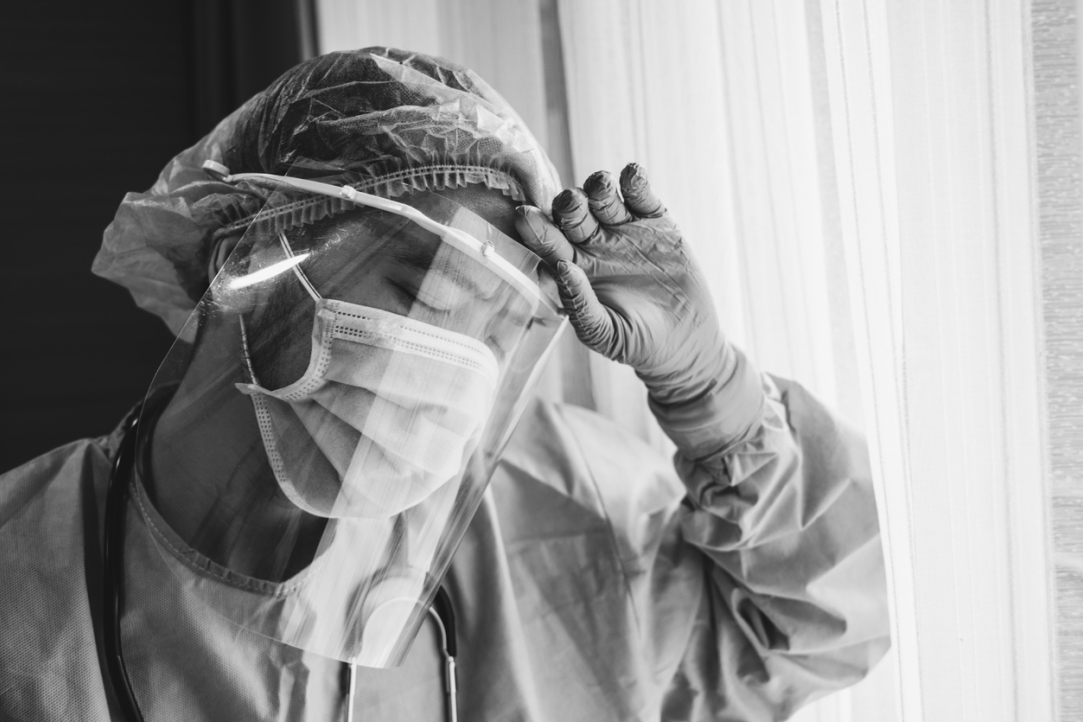Stress Disorders More Prevalent among Doctors due to the Pandemic

Psychologists from HSE University have joined their peers from Ekaterinburg to look into the impact of the pandemic on the mental health of Russian doctors. They found that medical staff are suffering from stress, anxiety, and depression more often than before. The results of the study were published in International Journal of Environmental Research and Public Health.
The number of mental disorders has grown considerably during the COVID-19 pandemic. People are suffering more from depression, anxiety, stress, and post-traumatic stress disorder (PTSD). Medics turned out to be the most vulnerable cohort from this perspective. They are at a higher risk of being infected with COVID, since they have contact with a lot of patients, work longer hours, and see more human suffering because of their profession. Over the last two years, scholars in different countries (USA, Italy, Great Britain, China, India, etc) have carried out research to see whether the pandemic has impacted medics’ mental health. They found, for example, that in Great Britain, 58% experience PTSD, anxiety, or depression, while in the U.S. and Australia, between 30% and 50% of medics suffer from these disorders.
To understand the situation in Russia, a team of researchers from HSE University, Ural Division of RAS Institute of Immunology and Physiology, and Ural Federal University launched a pilot project among dentists. They choose this field, as dentists face a high risk of being infected with COVID at work since they are in direct contact with patients’ saliva, and dental procedures generate aerosols—airborne liquid particles that carry viruses and bacteria.
The study involved 128 doctors and dentistry employees from Ekaterinburg. The participants were asked to fill out a few questionnaires, in which they answered how often they had experienced certain anxiety conditions over the past few weeks, such as insomnia, bad memories, depression, and anxiety. To evaluate stress levels, they used the Depression Anxiety and Stress Scale-21 (DASS-21), one of the most popular tools to diagnose mental distress today. They used two scales to evaluate PTSD symptoms: Impact of Event Scale-Revised (IES-R) and PTSD Symptom Scale-Self-Report (PSS-SR). They complement each other and provide a more complete understanding of the individual’s mental state.

Alena Zolotareva, one of the study authors, Senior Research Fellow at the HSE International Laboratory of Positive Psychology of Personality and Motivation
‘Of course, we cannot give a diagnosis based on a self-report scale only. But the participants’ responses provide a rather realistic image of medics’ mental health and assess the levels of mental distress.’
The results of the survey among Russian doctors turned out to be comparable with the results of similar studies in other countries. Almost 22% of dentistry employees experience moderate or severe symptoms of mental distress. On the DASS-21 scale, 20% of respondents show symptoms of depression, while 24% experience anxiety and stress. PTSD symptoms of various severity are experienced by 29.7% respondents on the PSS-SR scale and 7.1% on IES-R. The employees who contact patients directly demonstrate stronger PTSD symptoms than those who do not see patients in person (such as prosthetists). This can be explained by the fact that employees suffer from permanent fear of becoming infected during direct contact.
The results of the Russian study, however, had their own peculiarities. For example, respondents aged 51 to 64 are to have experienced the highest levels of depression, anxiety, stress, and PTSD. In other countries (such as India and Italy), the levels of mental distress were inversely related to age. This may be explained by the fact that in Russia, this age group is the most vulnerable in terms of financial well-being. At the same time, people over 64 did not participate in the survey due to limitations during the pandemic.
‘The pilot study helped us see that medics are a vulnerable cohort who often suffer from mental distress. And while the sample was small—we talked only to dentists from Ekaterinburg—the data is comparable with the results of similar international studies,’ said Alena Zolotareva. ‘For us this means that we should continue working on the project and implement a larger scale study with more medics from different regions. In the future, this will help develop effective mental support tools for medics.’
The paper’s authors say that as of today, traditional psychological practices, such as relaxation techniques, keeping a diary of anxiety thoughts and feelings, and asking friends and family for help can help to cope with stress. In addition, stress levels decrease as the pandemic goes on, people get more information about the virus, and effective vaccines appear. A recent study by researchers from the USA and China showed that despite higher levels of stress, indicators of happiness among medics are also higher, and remain high after the stress decreases. This means that the profession itself may probably be a powerful resource for overcoming mental unwellness.
See also:
'Our Goal Is Not to Determine Which Version Is Correct but to Explore the Variability'
The International Linguistic Convergence Laboratory at the HSE Faculty of Humanities studies the processes of convergence among languages spoken in regions with mixed, multiethnic populations. Research conducted by linguists at HSE University contributes to understanding the history of language development and explores how languages are perceived and used in multilingual environments. George Moroz, head of the laboratory, shares more details in an interview with the HSE News Service.
Researchers Present the Rating of Ideal Life Partner Traits
An international research team surveyed over 10,000 respondents across 43 countries to examine how closely the ideal image of a romantic partner aligns with the actual partners people choose, and how this alignment shapes their romantic satisfaction. Based on the survey, the researchers compiled two ratings—qualities of an ideal life partner and the most valued traits in actual partners. The results have been published in the Journal of Personality and Social Psychology.
‘It’s Thrilling to Have an Opportunity to Discuss Your Scientific Ideas with Interested People’
The International Laboratory of Dynamical Systems and Applications at HSE University–Nizhny Novgorod conducts in-depth theoretical and applied research, including the study of ocean waves, solar corona reconnections, volcanic phenomena, and ship stability. The lab’s researchers, who have received more than 20 significant research grants over the past five years, actively cooperate with Russian and international colleagues from China, Spain, the USA, the UK, Brazil, and other countries. Prof. Olga Pochinka spoke to the HSE News Service about the laboratory’s work.
'I Want Science to Help Me Explore New Horizons'
Eliana Monahhova worked as a journalist for various media outlets, but after realizing she frequently wrote long-form pieces on the psychology of the human brain, she decided to change her career focus. In this interview with the HSE Young Scientists project, she discusses the perception of fake content, shares her dream of meeting Robert Sapolsky, and talks about her upcoming YouTube channel.
Psychologists from HSE University Discovered How Love for Animals Affects Relationships with People
Researchers from HSE University have identified a connection between attachment to pets and attitudes toward nature and other people. The study found that the more joy people derive from interacting with their pets, the more they want to help others. However, love for animals is not always associated with concern for nature. The findings were published in the Social Psychology and Society journal.
Psychologists Study Daydreaming in Russian Cultural Context
Researchers at HSE University, having examined the role of daydreaming in the Russian cultural context, conclude that constructive daydreaming can help people with gaining insight into their life's trajectory, fostering personal growth, discovering existential meaning, enhancing psychological wellbeing, and cultivating a balanced temporal perspective. The study findings have been published in Cultural-Historical Psychology.
Workaholism Helps Young Narcissists Boost New Venture Performance
An international team of researchers including Professor Galina Shirokova, Director of the Strategic Entrepreneurship Centre at HSE University in St Petersburg, and her students Nailya Galieva and Diana Doktorova, examined the impact of narcissism on young entrepreneurs' success. The authors have demonstrated that a company founder's workaholism can amplify the influence of narcissism on a new venture's performance.
Plurilingualism Compensates for Low Extraversion in Nurturing Creative Skills
Researchers at the HSE Laboratory for Linguistic, Intercultural, and Creative Competencies have examined the role of the Big Five personality traits in moderating the development of creativity among individuals who use multiple languages and have intercultural experiences. It has been found that acquiring multiple languages and engaging with diverse cultures can enhance an individual's creativity and compensate for some deficiencies in communicative abilities. That said, language practices are likely to foster creativity only in mentally stable individuals. The paper has been published in the International Journal of Bilingual Education and Bilingualism.
Attainment of Happiness in Psychologically Mature Individuals Linked to Pursuit of Meaning
Austrian psychiatrist Viktor Frankl believed that the quest for meaning constitutes a fundamental and intrinsic motivation for all human beings. Some other authors suggest that the need for meaning or purpose only emerges at higher levels of personality development. According to a team of psychologists from HSE and the University of Paris Nanterre, individuals who have achieved higher levels of ego development are inclined to relinquish hedonistic motives in favour of cultivating mindfulness and embarking on a quest for meaning. These findings have been published in Frontiers in Psychology.
Married Men Less Prone to Workplace Burnout
Greater marital satisfaction lowers the risk of professional burnout, with this correlation being more pronounced among men than women. This is a conclusion made by HSE psychologists after conducting a study on the effect of social interactions on workplace burnout on a sample of 203 employees from several Russian companies. According to the researchers, gaining a better understanding of the specific aspects of burnout experienced by individuals makes it possible to address this syndrome more effectively. The paper has been published in Organizational Psychology.


